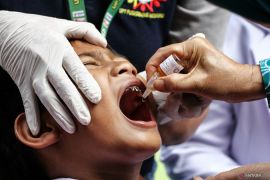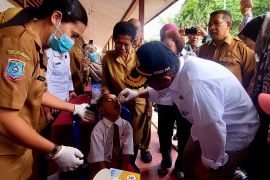The polio immunization drive is targeting children aged 9 to 59 months old, and that for measles infants nine month to 59 month old.Jakarta (ANTARA News) - In addition to the routine immunization program using five vaccines to prevent tuberculosis, polio, diphtheria, pertussis, tetanus, measles and hepatitis B, the government is currently conducting a mass immunization campaign against polio and measles in its efforts to free the nation from polio and measles.
The expanded mass immunization drive against polio and measles began simultaneously on Tuesday (Oct 18) and lasted until November 18, 2011 in 17 provinces.
The campaign`s target is giving measles vaccines to 14 million children, and polio vaccines to 16.6 million children, or 95 percent of the targeted children all over Indonesia.
The polio immunization drive is targeting children aged 9 to 59 months old, and that for measles infants nine month to 59 month old.
"The success of this activity is expected to significantly eradicate polio and measles in this country," Health Minister Endang Rahayu Sedyaningsih said in Jakarta when officially launching the campaign on October 18.
Infectious diseases are among the major causes of child deaths in Indonesia, despite the fact that they are preventable through timely vaccinations.
Since Indonesia conducted its first mass immunization program in 1956, the country has been relatively safe from fatal disease outbreaks.
In 2008, only around 68.3 percent of 65,781 villages had achieved the Universal Child Immunization (UCI) target, and following an acceleration program in 2010, the UCI coverage increased to 75.3 percent of 75,990 villages.
"Immunization is the most cost effective program to reduce the morbidity and mortality rates of vaccine-preventable diseases," she said.
The government is spending about Rp 400 billion (US$45.2 million) every year on vaccines, including for polio and measles.
For measles, Indonesia has been able to reduce the number from 180,000 cases in 1990 to around 20,000 cases in 2010, and cut the mortality rate by 90 percent.
Routine immunization against measles in the country has been implemented since 1984. The coverage of vaccination against measles has increased from only 12.7 percent n 1984 to 85.4 percent in 1990, and an average of 90 percent in 2010.
However, the coverage is not spread evenly throughout Indonesia due to geographical, social and economic obstacles.
The health ministry has launched additional immunizations against measles and polio for three years, since 2009 in three stages.
The first stage was carried out in three provinces, namely Aceh, North Sumatra and North Maluku, on June 10-24, 2009.
The second stage was in October 2010 in 11 provinces, namely Maluku, West Papua, West Sumatra, Riau, Jambi, South Sumatra, Bengkulu, Bangka Belitung, Riau Islands, East Nusa Tenggara (NTT), and Banten.
The third or last stage is being carried out at present in 17 provinces, namely East Kalimantan, West Kalimantan, South Kalimantan, Central Kalimantan, North Sulawesi, Southeast Sulawesi, Central Sulawesi, West Sulawesi, South Sulawesi, Gorontalo, Papua, West Nusa Tenggara (NTB), Lampung, East Java, Central Java, West Java, and Jakarta.
The health ministry`s director general of disease control and environmental health, Tjandra Yoga Aditama, said the mass immunization program is one of the priority programs of the health ministry as preventive measure and the government`s commitment to achieving the Millennium Development Goals (MDGs) in particular to reduce the children and maternal mortality rate.
PT Bio Farma pharmaceutical company is supporting the program by providing polio vaccines.
"Bio Farma has been proven capable of meeting the world`s polio vaccine demands and its products have been used in 110 nations. Bio Farma has supplied 1.4 million doses annually," PT Bio Farma`s marketing director, Sarimuddin Sulaeman, said.
In the country`s capital city of Jakarta, some 990,753 children are expected to be immunized against polio and measles during the month-long campaign.
Of the total 990,753 children, 461,488 children will get measles vaccines and 529,265 others will receive polio vaccines.
"The Jakarta administration has allocated funds amounting to Rp 5.3 billion for the polio and measles immunizations for children . So, the public should not worry because the immunization drive is free," Jakarta Governor Fauzi Bowo said in the launch of the additional immunization campaign at Duren Sawit, East Jakarta Timur, Tuesday (Oct 18).
The Jakarta administration supports the campaign because the city has placed the community health services as a top priority, according to the governor.
Jakarta has deployed 2,275 paramedics and 26,420 volunteers for the implementation of the immunizations at 6,037 immunization posts in the capital city`s five municipalities and one district.
"To demonstrate the seriousness and readiness of the Jakarta administration, the measles and polio additional immunization campaign is conducted simultaneously today," Governor Fauzi said.
According to Health Minister Endang Rahayu, the additional immunization is to strengthen immunity of children in order to achieve polio-free Indonesia.
"We urge religious prominent leaders, community prominent figures and other parties to support this activity. Please convince the public that the vaccines are halal according to the religion. The same types of vaccines have been used in other Muslim majority nations which are members of the OIC (Organization of Islam Cooperation)," the minister said.
According to the Key Facts of the World Health Organization (WHO),
polio (poliomyelitis) mainly affects children under five years of age.
One in 200 infections leads to irreversible paralysis (usually in the legs). Among those paralyzed, 5 percent to 10 percent die when their breathing muscles become immobilized.
Polio cases have decreased by over 99 percent since 1988, from an estimated 350 000 cases then, to 1604 reported cases in 2009. The reduction is the result of the global effort to eradicate the disease.
In 2010, only four countries in the world remain polio-endemic, down from more than 125 in 1988. The remaining countries are Afghanistan, India, Nigeria and Pakistan.
Measles is a highly contagious, serious disease caused by a virus. More than 20 million people are affected by measles each year, according to the data of WHO.
In 1980, before widespread vaccination, measles caused an estimated 2.6 million deaths each year.
It remains one of the leading causes of death among young children globally, despite the availability of a safe and effective vaccine.
An estimated 164 000 people died from measles in 2008 ? mostly children under the age of five.From 2001 to 2011 an estimated one billion children aged 9 months to 14 years who live in high risk countries were vaccinated against the disease. Global measles deaths has decreased by 78 percent from 733 000 in 2000 to 164 000 in 2008.(*)
Reporter: By Fardah
Editor: Heru Purwanto
Copyright © ANTARA 2011











